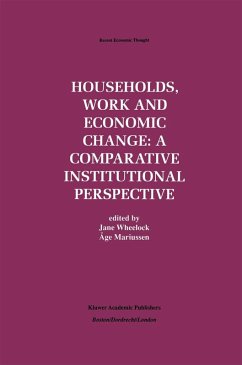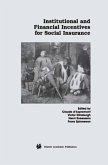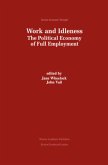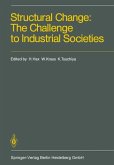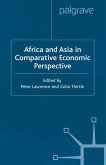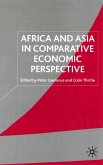This book argues that contemporary economic and political change make household level behaviour increasingly significant in the economy. The book investigates interrelations between household and economic change. The conclusions which emerge from these investigations are relevant to policy makers in both social democratic and neo-liberal countries. The comparative approach taken in the book is amenable to the application of institutional theory, which is used to analyse work. The results are interesting to students of economics, political science, sociology and geography, as well as to research and policy specialists from these disciplines.
Young men choosing a traditional working career 189 Young women making modern choices 191 The struggles of young men versus the success of young women 192 CONCLUSIONS Changing economies, changing households 195 Jane Wheelock and Age Mariussen Summing up 195 Institutional comparisons: empirical analysis 197 Theoretical implications 201 Policy implications 204 Bibliography 207 Index 231 ix ILLUSTRATIONS Figures 1. 1 Institutional change as a theme in economics and sociology 15 1. 2 The household in the total economy 28 2. 1 The household in the production, reproduction and consumption cloverleaf 39 10. 1 Characteristics of the two extreme groups of farmers, 'sceptics' and 'radicals' 155 11. 1 Flexibility in the family economic unit 161 Tables ILl Changing employment structure in Wearside and Mo i Rana, selected years 67 11. 2 Employment change comparisons, Wearside!Great Britain and Mo i Rana/Norway, selected years 68 11. 3 Major industrial sectors, Wearside and Mo i Rana, selectedyears 69 11. 4 Employment in Wearside and Mo i Rana: gender and part-time! full-time breakdown, selected years 70 The degree of change in the organisation of household work 7. 1 116 Economic status categories and family succession 10. 1 150 12. 1 Economic position of young adults (16-29) in Newcastle 176 12.
Young men choosing a traditional working career 189 Young women making modern choices 191 The struggles of young men versus the success of young women 192 CONCLUSIONS Changing economies, changing households 195 Jane Wheelock and Age Mariussen Summing up 195 Institutional comparisons: empirical analysis 197 Theoretical implications 201 Policy implications 204 Bibliography 207 Index 231 ix ILLUSTRATIONS Figures 1. 1 Institutional change as a theme in economics and sociology 15 1. 2 The household in the total economy 28 2. 1 The household in the production, reproduction and consumption cloverleaf 39 10. 1 Characteristics of the two extreme groups of farmers, 'sceptics' and 'radicals' 155 11. 1 Flexibility in the family economic unit 161 Tables ILl Changing employment structure in Wearside and Mo i Rana, selected years 67 11. 2 Employment change comparisons, Wearside!Great Britain and Mo i Rana/Norway, selected years 68 11. 3 Major industrial sectors, Wearside and Mo i Rana, selectedyears 69 11. 4 Employment in Wearside and Mo i Rana: gender and part-time! full-time breakdown, selected years 70 The degree of change in the organisation of household work 7. 1 116 Economic status categories and family succession 10. 1 150 12. 1 Economic position of young adults (16-29) in Newcastle 176 12.

